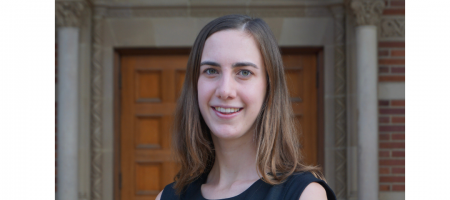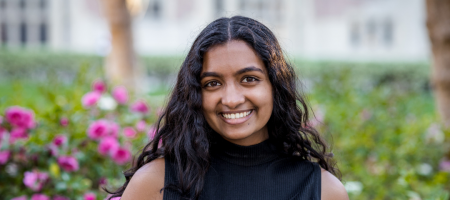Student Spotlight – Fiona Osborn
Meet UCLA undergraduate researcher Fiona Osborn!
Fiona Osborn majors in Geography/Environmental Studies and minors in Global Studies and Geographic Information Systems and Technology and is in our Undergraduate Research Scholars Program (URSP)! The title of her project is “Impact of Agricultural Expansion in the Brazilian Cerrado.” Her goal is to shed light on the increasing threat facing protected lands and indigenous communities in the state of Tocantins. Her best piece of advice is to not feel pressured to know your specific research topic right away.
How did you first get interested in your research project?
I first became interested in my research project last year in my world vegetation class, where I learned about tropical savanna ecosystems and the major threats of land use change and subsequent degradation these areas are facing. I was surprised to learn the Cerrado, or the Brazilian Savanna, made up the second largest biome in South America and was severely threatened but rarely discussed and only recently studied. Not only was I interested in this ecosystem, but I was also fascinated by the rich history of the region and the dynamics between the environment and various sociopolitical processes. My favorite part about my research project has been the way it combines my interests of the natural landscape and the relationships people have with it, as well as the way it allows me to use the analytical tools I’ve learned as a GIS minor to study the topic more in-depth.
What has been the most exciting aspect of your research so far?
The most exciting aspect of my research so far has been the interdisciplinary nature of my topic; I’ve found it extremely interesting to explore the interconnections between the natural environment in Tocantins, Brazil and current economic development and policies in the region that have had tremendous impacts on the native vegetation and local communities.
What has surprised you about your research or the research process?
One thing that has surprised me about the research process has been the amount of preparation that has to go into a study. Although I am planning to conduct my own remote sensing analysis of satellite imagery to map out the extent of landcover change in my study area, I have spent the majority of my time collecting data and conducting background research on the native vegetation and climate in the Cerrado, as well as social/political issues that have impacted the environment and indigenous populations. This has been surprisingly gratifying, and I have enjoyed learning all I can about my research topic. This process has also provided me with invaluable insights into the difficulties of data collection, and I have found it rewarding to see how far my research has come in just a few months.
What is one piece of advice you have for other UCLA students thinking about doing research?
Don’t feel pressured to know your specific research topic right away. It has taken me time to develop my interests and discover how these could be woven together into a single project. Even throughout the research experience, my question has evolved as I develop my understanding and learn about both the complexity of the issue and how I can contribute in a more meaningful way.
What effect do you hope your research has in your field, at UCLA, in your community, or in the world?
I hope to build on existing literature on the Brazilian Cerrado by focusing on an area that has only recently turned into a hotspot for deforestation and land degradation. My ultimate goal is to shed light on the increasing threat facing protected lands and indigenous communities in the state of Tocantins. In the future, I hope to build on this research experience and continue to study the impacts land degradation has on local communities.



